Affiliate Disclaimer
Some links in this article are affiliate links. We may earn a small commission if you make a purchase through these links, at no extra cost to you. We only recommend products we find useful to our readersWhat we eat plays an important role in hormone health and fertility, and fat is an essential component. Good fats facilitate hormone formation, decrease inflammation, and enhance reproduction.
But not all fats are the same—some support hormone balance, while others cause inflammation. This interferes with estrogen and progesterone balance, thereby affecting fertility.
This article will guide you in choosing the best oils for hormone balance and fertility while highlighting the oils that may contribute to hormone-related problems.
Simple yet smart kitchen choices can improve hormone health and boost natural conception chances.
Also, Read: Elevate Your Cooking Game: 5 Essential Kitchen Gadgets Every Health Nut Needs
How Cooking Oils Impact Hormonal Health
Cooking oils contain fatty acids and go through various methods of processing; each method affects hormone health differently. The type of fat present in these oils influences the production of hormones, inflammatory processes, and the endocrine system as a whole.
Essential Fatty Acids and Hormone Regulation
Essential fatty acids such as omega-3 and omega-6 are crucial in hormone production and their balance. Omega-3 is found in oils like flaxseed and walnut, and its anti-inflammatory properties make it important in hormone health. An excess of omega-6, mostly consumed through vegetable oils, is usually associated with inflammatory and hormonal imbalances.
Effects of Oxidized and Processed Oils on the Endocrine System
These oils are highly processed by repeated heating, producing compounds that are quite dangerous and disruptive for the endocrine system. For instance, polar compounds formed during frying processes have been linked to endocrine disruption, as well as food safety and environmental safety issues.
Instead, use cooking oils rich in healthy fats and avoid highly processed oils or repeated heating to support your hormone health and fertility.
The Best Cooking Oils for Hormonal Balance and Fertility

Choose suitable cooking oils for hormonal balance and fertility. These oils should contain healthy fats and nutrients necessary for producing hormones, reducing inflammation, and supporting reproduction. The following are some of the best cooking oils:
1. Extra Virgin Olive Oil
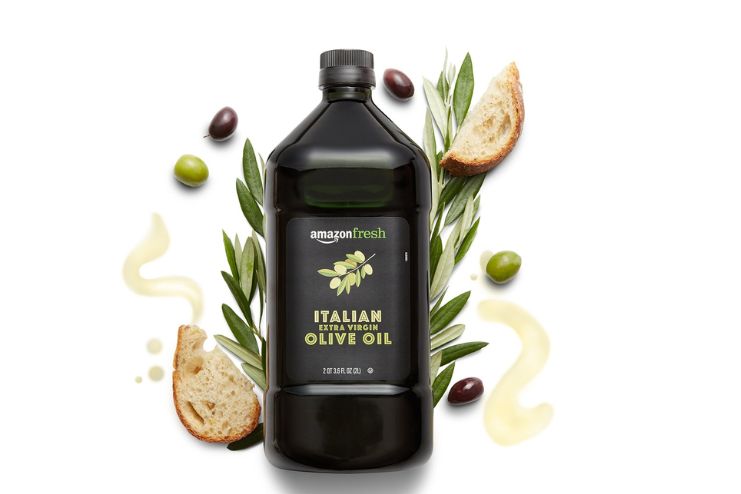
Extra virgin olive oil (EVOO) is rich in monounsaturated fats and polyphenols that have proven beneficial for ovarian health and testosterone balance. Its anti-inflammatory properties are beneficial in polycystic ovary syndrome (PCOS) and endometriosis. Studies suggest that EVOO can improve sperm quality and function, enhancing the success of assisted reproductive technologies (R).
Buy Amazon Fresh Italian Extra Virgin Olive Oil
2. Coconut Oil
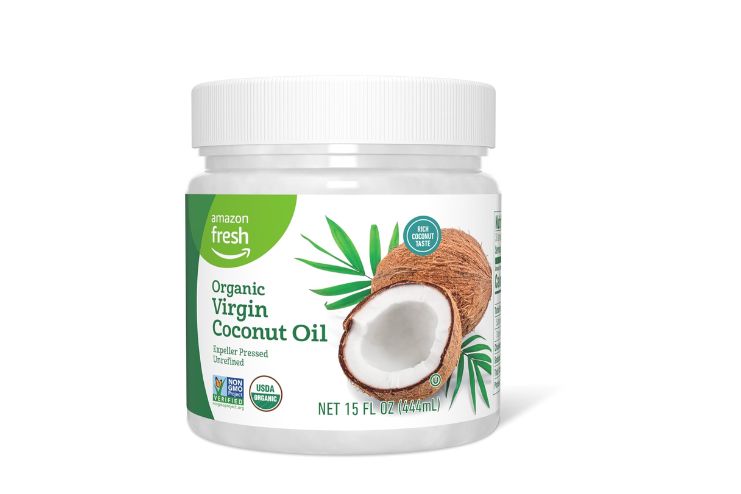
Coconut oil consists of medium-chain triglycerides (MCTs), which support thyroid function and progesterone production—both essential for reproductive health (R). Its antimicrobial properties support gut health, aiding hormone regulation.
Buy Amazon Fresh, Organic Virgin Coconut Oil
3. Avocado Oil
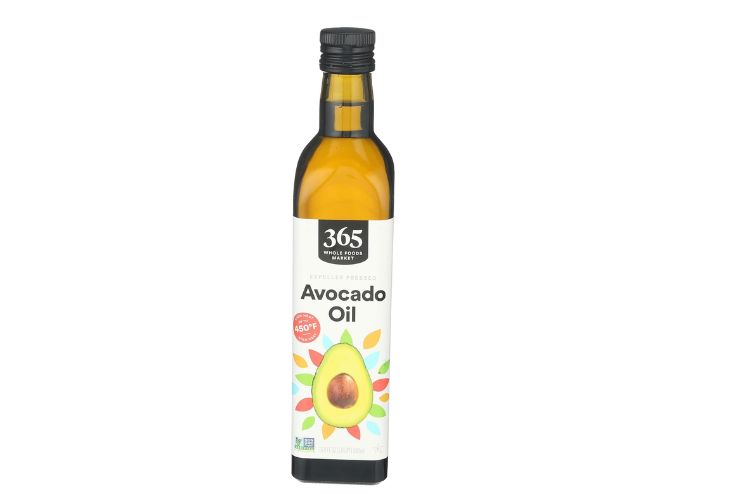
Avocado oil is rich in oleic acid, a monounsaturated fat that helps reduce inflammation and supports estrogen metabolism. It also contains vitamin E, which is essential for reproductive health. Studies highlight the important nutrients avocados can contribute, especially folate, which is beneficial for improving fertility and reproductive health (R).
Buy 365 by Whole Foods Market, Avocado Oil
4. Flaxseed Oil (Cold Pressed)
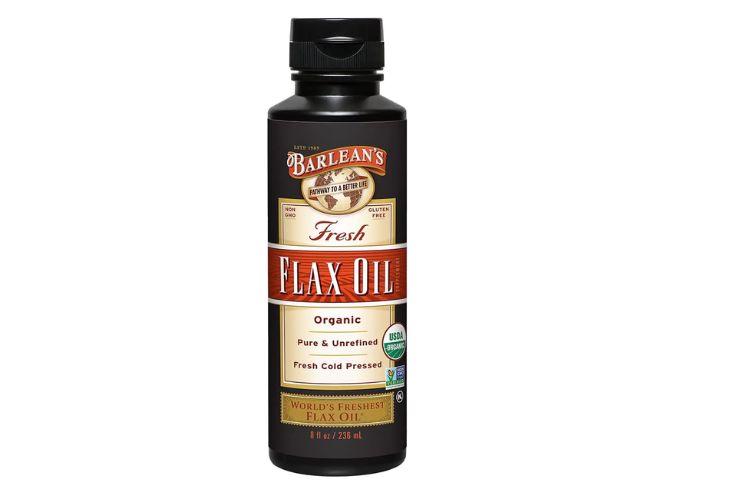
Flaxseed oil is a rich source of omega-3 fatty acids and lignans, which help balance estrogen levels and support menstrual health and ovulation. Research shows flaxseed oil may mimic estrogen’s effects, making it a good dietary choice for hormone replacement therapy (R).
Buy Barlean’s Organic Flaxseed Oil from Fresh Cold-Pressed Flax Seeds
5. Ghee (Clarified Butter)

Ghee is rich in butyrate, a short-chain fatty acid that promotes gut health and hormone elimination. It is also a good source of fat-soluble vitamins A, D, E, and K, which are essential for reproductive health.
Buy 4th & Heart Vanilla Bean Grass-Fed Ghee, Clarified Butter
Include these oils in your diet to maintain optimum hormonal balance and fertility.
Cooking Oils to Avoid for Hormonal Health and Fertility

The choice of cooking oil plays a crucial role in maintaining hormonal balance and reproductive health. Some oils will act against the endocrine system, promote inflammation, and subsequently harm reproductive health. The following are some cooking oils that should be avoided:
1. Vegetable Oils (Soybean, Corn, Canola, Sunflower, Safflower)
Vegetable oils are rich in omega-6 fatty acids. Excess consumption of these oils leads to chronic inflammation, which contributes to hormonal imbalances and fertility problems. A diet rich in omega-6 and low in omega-3 causes these problems. In addition, various processing methods used for these oils introduce many harmful compounds, further affecting hormonal health.
2. Hydrogenated Oils and Trans Fats (Margarine, Shortening, Processed Cooking Sprays)
Hydrogenated oils and trans fats are associated with an increased risk of infertility. These inhibit insulin sensitivity, leading to metabolic issues and negatively impacting ovulation. Trans fats increase inflammation and disrupt hormonal balance and reproductive function, further worsening the problem.
3. Oxidized Palm Oil
Palm oil, when repeatedly heated, starts oxidizing, which has been reported to affect reproductive health. This oxidative stress causes fertility issues. Hence, it is essential to check the quality of palm oil to avoid any chances of hormonal disruption.
Reducing the use of these oils or completely avoiding them can minimize hormonal imbalances and improve reproductive health drastically. Switch to better alternatives, as mentioned above, for improved fertility.
How to Choose and Use Cooking Oils Wisely
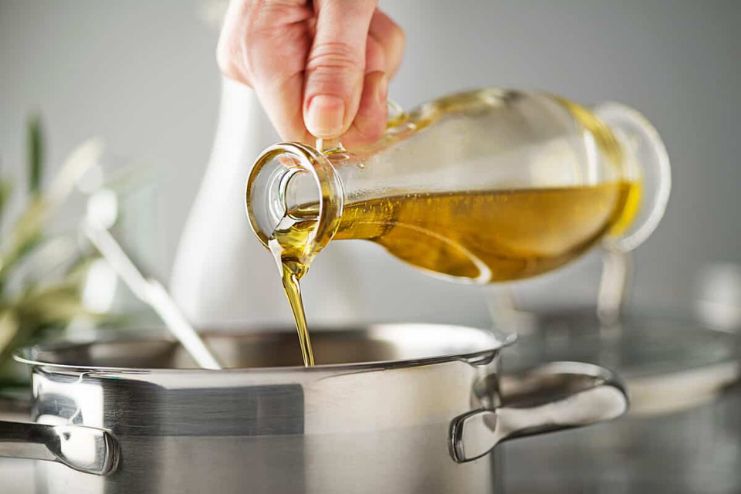
Using the right type of cooking oil can greatly impact your hormonal health and fertility. Here is how to choose:
Cold Pressed Vs. Refined Oils—The Processing Matters
Cold-pressed oils are mechanically extracted without using heat, preserving their natural nutrients and antioxidants. This method retains the beneficial compounds that support hormone production and balance. In contrast, refined oils undergo heat and chemical processing, stripping away these nutrients and introducing harmful substances. Using organic, unrefined oils ensures the intake of pure and nutrient-rich fats, enhancing your hormonal health.
Smoke Points: Best Oils for High-Heat and Low-Heat Cooking
The temperature at which an oil begins to smoke is called its smoke point, the stage where harmful compounds start to form.
- For high-heat cooking, such as frying and sautéing, consider oils with high smoke points, like refined avocado oil or refined olive oil.
- For low-heat cooking or dressings, unrefined oils like extra virgin olive oil are suitable.
High-Heat Cooking Oils
- Refined Avocado Oil – ~520°F (271°C)
- Refined Olive Oil – ~465°F (240°C)
- Ghee (Clarified Butter) – ~450°F (232°C)
- Refined Coconut Oil – ~400°F (204°C)
- High-Oleic Sunflower Oil – ~450°F (232°C)
- Peanut Oil – ~450°F (232°C)
Medium-Heat Cooking Oils
- Extra Virgin Avocado Oil – ~375°F (190°C)
- Virgin Coconut Oil – ~350°F (177°C)
- Unrefined Sesame Oil – ~350°F (177°C)
- Almond Oil – ~420°F (216°C)
Low-Heat Cooking Oils (Best for Drizzling, Salad Dressings, and Light Sautéing)
- Extra Virgin Olive Oil (EVOO) – ~325-375°F (163-190°C)
- Flaxseed Oil – ~225°F (107°C) (Best for cold use)
- Walnut Oil – ~320°F (160°C) (Best for cold use)
- Hemp Seed Oil – ~330°F (165°C)
- Pumpkin Seed Oil – ~320°F (160°C)
Using oils within their proper temperature ranges preserves their nutritional integrity and prevents the formation of harmful byproducts.
Storage Tips: How to Prevent Oxidation and Rancidity in Oils
Proper storage of cooking oils is essential to preserve their quality, prevent rancidity, and avoid the formation of unhealthy compounds.
- Keep them in a cool, dark place away from direct sunlight and heat sources.
- Use airtight glass or metal containers to minimize exposure to oxygen.
- Maintaining a storage temperature of 55-60°F (12-15 °C) preserves the freshness and nutritional value of the oils.
Oil Rotation: Why Using a Variety of Oils Can Optimize Hormonal Balance
Using a variety of oils in your diet balances different fatty acids, which are essential for hormonal health. By rotating oils, you will get sufficient amounts of omega-3, omega-6, and monounsaturated fats. Each serving will have its unique role in hormone production and regulation. For example, flaxseed oil is rich in omega-3s, while olive oil is composed of monounsaturated fats. This diversity is necessary to support endocrine function and hormonal balance.
Carefully selecting, storing, and rotating your cooking oils can benefit your health in terms of hormonal balance and fertility.
Conclusion
You now know how cooking oils can affect a person in terms of hormonal balance and fertility. Healthy oils like extra virgin olive oil, coconut oil, avocado oil, flaxseed oil, and ghee are rich sources of healthy fats that promote hormone production, reduce inflammation, and ensure reproductive health.
Highly processed oils such as soybean, corn, canola, sunflower, safflower, hydrogenated oils, and refined palm oil can cause inflammation, fertility issues, and disrupt the endocrine system.
Choose cold-pressed, unrefined oils and use them based on their smoke points. Store them properly to prevent oxidation, and keep rotating the oils for better hormone health. Such small dietary changes can make a big impact on your health.
References
- https://www.medicalnewstoday.com/articles/essential-fatty-acids
- https://www.verywellhealth.com/what-are-seed-oils-8742630
- https://pubmed.ncbi.nlm.nih.gov/30412894/
- https://olivewellnessinstitute.org/article/benefits-of-evoo-for-couples-who-are-trying-to-conceive/
- https://www.maxapress.com/article/doi/10.48130/FMR-2023-0013
- https://www.researchgate.net/publication/371583296_Avocados%27_effect_on_hormonal_physiology_a_comprehensive_narrative_review
- https://pmc.ncbi.nlm.nih.gov/articles/PMC8025639/
- https://www.thehivefertility.in/benefits-of-ghee-during-pregnancy/
- https://naturalwomanhood.org/seed-oils-fertility/
- https://share.upmc.com/2019/05/fueling-fertility-with-nutrition/
- https://journals.lww.com/apjr/fulltext/2023/12040/oxidized_palm_oil_impairs_reproductive_functions.5.aspx
- https://onlinelibrary.wiley.com/doi/full/10.1111/and.14235
In this Article


















